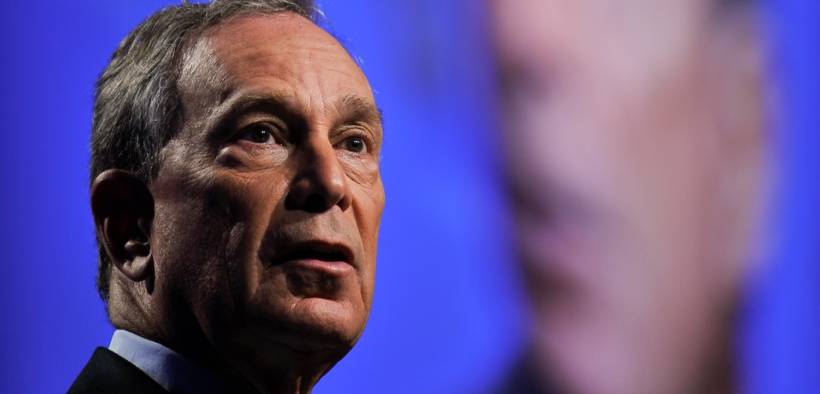Guys, Stop Being So Mean to the Billionaires

I don’t know about you, but I’m getting pretty sick and tired of billionaires telling us what we can and can’t do in a political sense and why taxing them “to the hilt,” to borrow their verbiage, is so blatantly unfair.
On behalf of the billionaires of the United States of America, I would like to request that you, the reader, refrain from any talk of a wealth tax or tax increase on the super-rich.
While we’re at it, you should abandon all notions of supporting the Green New Deal or Medicare for All. None of this is politically feasible, and what’s more, you’d be taxing job creators, thereby hurting employment and the U.S. economy. In other words, just go back to enjoying the status quo.
You big meanies.
Dispensing with that bit of pretense, I don’t know about you, but I’m getting pretty sick and tired of billionaires telling us what we can and can’t do in a political sense and why taxing them “to the hilt,” to borrow their verbiage, is so blatantly unfair.
The intertwined issues of personal finances, wealth, and taxation have gained new resonance with the entry of Michael Bloomberg into the 2020 presidential race. Evidently, having one billionaire on the Democratic side of things already (Tom Steyer) isn’t enough.
Also, there’s the matter of safeguarding certain ideologies. With progressives Elizabeth Warren and Bernie Sanders more than relevant in the Democratic primary and Joe “I Got Along Fine with Segregationists” Biden not the sure bet to win the nomination that some establishment Dems might have envisioned at the start of his candidacy, Bloomberg’s late-start bid can be seen as the last gasp of old-guard centrists trying to cement their place in the American political landscape. You know, unless Hillary Clinton jumps in too, which in that case, just go ahead, shoot me, and be merciful. I just don’t think I can bear to watch that a reprise of that fiasco.
Because money equates to power and political influence, Bloomberg is not the only billionaire who is wont to gripe about plans to claw back dollars from the super-rich or lament Sen. Warren’s ascendancy in polls and have media outlets ready to listen. Microsoft co-founder Bill Gates, when recently asked about Warren’s proposed “ultra-millionaire tax,” joked about how much he’d have left under such a policy. Gates also highlighted how much he has already paid in taxes as well as given in a philanthropic sense, effectually debating whether or not a tax hike might depress charitable contributions.
All kidding aside, Gates realistically has more money than he or his family will ever need. The notion Warren’s tax plan or that of any similar framework could jeopardize his finances or his ability to donate is absurd. What’s yet worse is his response or lack thereof to a question about whether he would vote for Donald Trump’s re-election over Warren or any other Democratic candidate. For someone who has slammed Trump and his policies in the past, Gates appears to be putting his money where his critical mouth and thinking should be. The result is not a good one.
Before Gates cracked wise about being placed into a whole new tax bracket, there was former Starbucks CEO Howard Schultz, who not only has similarly derided Warren’s ultra-millionaire tax as “ridiculous,” but once had visions of a presidential run dancing in his head as he went on a promotional book tour. Schultz’s “run” ended before it began, seemingly generating more scorn than praise from the general public. Hell, the man didn’t even make it past September.
Schultz’s decision to mount or not mount a campaign certainly garnered a lot of media attention prior to his opting for the latter, however, if for no other reason than the existential dread which accompanied the possibility, even if remote, that he might vie for president as an independent. And while he may have been heckled at stops on his tour and ratioed on Twitter, news of his political contemplation made the rounds on cable news and in major newspapers in much more favorable terms.
His both-sides-ing of Democrats and Republicans despite the GOP harboring honest-to-goodness white supremacists earned him not condemnation, but a platform by which to dispense his ridiculous comparisons. As it does too often these days, the world of political punditry largely failed to diagnose Schultz’s shortcomings prior to his abandonment of his aspirations for the time being. Though if you’ve been paying attention to the Bret Stephenses and the Donny Deutsches of the world, this may come as no great shock to you.
Which brings us now to Michael Bloomberg, presidential candidate, who has derided the GND as “pie-in-the-sky,” has insisted M4A will “bankrupt the country,” and who possesses a—shall we say—complicated political legacy dating back to his time as mayor of New York City, including but not limited to his repeated switches away from and later back toward the Democratic Party, his push to extend the city’s term limits law so he could serve a third term in office, and his support for much-criticized policies such as stop-and-frisk. In many respects, he appears to be out of step with his chosen party of the moment, not to mention prospective Democratic voters.
Try telling to this to the talking heads at MSNBC, however. In an on-air segment shortly after Bloomberg’s filing to get his name on the Alabama Democratic primary ballot, Meet the Press host Chuck Todd rather nauseatingly argued that Bloomberg is not only a “serious contender,” but is among the more progressive candidates on the core issues appealing to leftists. Bernie Sanders already had fired shots at Bloomberg’s candidacy, saying that the former NYC mayor “ain’t gonna buy this election.” Tom Steyer, fellow billionaire, suggested Bloomberg should agree to the idea of a wealth tax if he were serious about running for president. Todd’s own panel guests didn’t even seem to be buying this analysis.
And yet, here was Todd, trying to make the case for Bloomberg because of his, um, supposed appeal to suburban Republicans? While I’m all for Chuck Todd embarrassing himself on live television, these talking points do nothing but insult the intelligence of the viewer. Michael Bloomberg is a “serious” candidate because of his personal finances. End of story. He may have better electoral prospects than his successor, Bill de Blasio, but that’s not saying much considering de Blasio (who doesn’t believe Bloomberg should be running in the first place, by the by) ended his run not long after Howard Schultz suspended his ill-fated quest for glory in 2020. In an era in which the status quo is being scrutinized and flat-out rejected, Bloomberg seems like a prototypical bad candidate. All this before we get to his past comments on women and alleged inappropriate conduct toward them, which make him look like the center-left’s version of Trump. This is who Democratic Party supporters should back?
Ah, but this is what privilege looks like. It affords you ample opportunity to publicly lament the concept of a wealth tax and have other people give you free press and do your dirty work trying to convince the public of your legitimacy for you. It gives you a ticket to the dance without having to do any of the hard work of building a political profile or raising the funds to mount a campaign. It lets you create a toxic work environment that encourages the open objectification of female employees and emboldens male leadership to make sexual advances and inappropriate comments with impunity. The potential loss of this privilege and criticism of the above may be interpreted by people like Bloomberg as unfairness. But it’s a bit of the scales tipping in the other direction—and perhaps they haven’t tipped quite far enough yet.
For a progressive like myself, what is so frustrating about the existence of presidential wannabes like Michael Bloomberg and Howard Schultz—aside from the notion they are glaring examples of why we need to get big money out of politics—is that they only serve to amplify the voices of other centrists like them, making the case to Americans that there is no way we can achieve the kinds of policies the Bernie Sanderses and Elizabeth Warrens of the world envision. They’re too unrealistic. They’d be a disaster for the country. They’re akin to the pony that children ask for for their birthdays or Christmas. You’re not a child, are you, prospective voter?
Presumably, Bloomberg and Schultz are smart men. They might be prone to delusions of grandeur, mind you, but who isn’t from time to time? But yes, this is why their take on issues like the environment and health care are so disappointing. If someone like Bloomberg is such a visionary leader, why can’t he think of a way to make initiatives like the Green New Deal and Medicare for All work?
For that matter, why can’t other moderates see the light? In mathematics, students are taught to work backwards to solve problems. Sure, the potential solutions for the United States might be more complex than with a sixth-grader’s homework. The mechanism, though, is the same. Before saying no to an idea, why not play around with it? What meaningful societal advancement has ever arisen from defeatist capitulation?
The obvious complication herein, of course, is that Bloomberg and others may be aware of how to work to solve these problems, but actively choose to ignore these avenues. Then again, maybe they simply are blinded by a mindset that refuses to let them envision the full range of possibilities. One might argue that there are no conditions by which men like Bloomberg and Schultz could appreciate the big picture. They are so far removed from what life is like for average Americans they simply can’t acknowledge their situations.
Sure, this critique can be leveled at politicians of all make and model to a lesser or greater degree; Bernie supporter that I am, I’d be remiss if I didn’t point out that he is a millionaire in his own right on the strength of his book sales. For the likes of these billionaires, however, it rings especially true. What’s more, it can’t be ruled out that they aren’t panning Elizabeth Warren’s ultra-millionaire tax out of self-serving interest. Even when they have more money than God like Bill Gates does.
Could Michael Bloomberg make an impact on the 2020 presidential race? Perhaps. Is he what America needs, though? No, and you can bet Donald Trump is licking his chops at the prospect of facing him in the general election. Democrats, there’s too much at stake to entertain thoughts of what President Bloomberg might do for the country.
Sorry to be such a meanie about it.








No person is worthy of such obscene wealth. No person has truly earned anything remotely approaching such wealth.. Only the insanely greedy and power-mad aspire to and aggregate to themselves such obscene wealth.
The USA is an out-and-out plutocracy. Full stop.